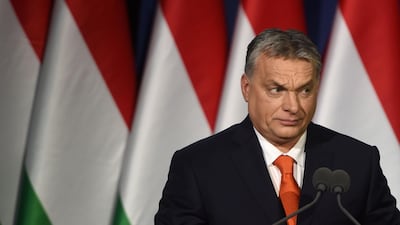Stephen I, the first king of Hungary, ensured his name would be remembered throughout the ages by keeping his enemies at bay beyond the borders of his new country.
A statue in Budapest's Heroes' Square is testament to his victories against the Bulgarians and Poles and his attempts to transform Hungary into a Christian state.
One thousand years later, Prime Minister Viktor Orban has picked up the theme. The 54-year-old is seeking an unprecedented third consecutive term as self-styled defender of Christian Europe – only this time from the spreading influence of Islam.
"We have prevented the Muslim world from inundating us from the south," he said in a state of the nation address last month. "We are standing firm. Our defence lines are sufficient to hold back the largest flows…. We are the people who think that the last hope for Europe is Christianity."
Mr Orban cemented his position as Europe’s most vociferous anti-migrant leader by building barbed-wire fences along the borders with Serbia and Croatia to keep out refugees during the 2015 migrant crisis.
Mr Orban's anti-migrant, anti-Muslim programme and his attempts to silence critical voices is part of a project that he has dubbed “illiberal democracy”. He rails against multicultural Europe and champions the ‘Hungarian way’ of life.
The programme has won admirers from other nations, such as Poland, raising the prospect that Orban’s world view and tactics will spread further across the European Union.
“If these tactics work so well, why could then not be applied to other countries such as Italy, Austria and elsewhere?” said Péter Krekó, an analyst from Budapest consultancy Political Capital.
The message has proved potent with polls suggesting his Fidesz party would be the largest at the April 8 polls, owing to friendly oligarchs’ grip on the mass media and a weak and divided opposition.
________________
Read more:
UAE least corrupt in Mena region as Hungary slides in watchdog's report
Hungarian PM positions himself as Christian saviour of Europe
How to win friends and influence people, the Soros way
________________
But an unexpected victory last weekend for an independent mayoralty candidate in a Fidesz powerbase has created a chink of opportunity for the fractured opposition.
They are considering collaborating to produce single anti-Fidesz candidates to run in more than half of the 199 contested seats to try to unseat the Orban government.
Mr Orban’s response has been to ramp up the threat, warning on Friday that women and children would not be safe from mass migration and the country’s cultural identity would be eroded.
He has sought to batter home the message with a billboard campaign. The main image is of the Hungarian-born financier, George Soros - whom Orban claims is plotting to use his wealth to bring millions of migrants to Europe - with his arms around four opposition leaders.

The manipulated picture shows them standing in front of a holed border fence brandishing wire cutters. The tagline: “Together they want to tear down the fence.”
But Hungary’s migration policy is unlikely to change whatever the outcome of the election with most parties saying they would keep the barriers in place, said Andrea Virag, of the liberal Republikon thinktank. The main opposition party said it would consider extending it.
A Republikon survey last week found that Orban’s party was leading the race with 48 per cent of support compared to 19 per cent for the leading opposition group, the far-right Jobbik party.
Jobbik has been undercut by the premier’s championing of their traditional anti-migration platform.
"For the last eight years, Fidesz has taken a lot of our programme," Marton Gyongyosi, a senior member of Jobbik told the National. "We shouldn't be sorry for that."
Jobbik has repudiated some of its anti-Semitic views and re-fashioned its message to fight on an anti-corruption ticket, seizing on a financial scandal linked to an Orban family member.
Jobbik said it will work only with two other new parties untainted by the “corruption of the last 28 years” after the end of communism in Hungary.
They make for strange political bedfellows with the far-right: One is a Green-liberal party and the other new youth-oriented movement, Momentum, which has drawn inspiration from the rise of En Marche! created by Emmanuel Macron.
Momentum scored an early hit by forcing Mr Orban to dump a plan to host the 2024 Olympics over corruption fears but barely features in national polling.
Momentum said it would consider stepping back to allow a talented Jobbik candidate a clear run for a seat, as long as they were not tainted by racism or corruption.
“As the first free generation of Hungarians, we have a historic responsibility to get this government out,” said Daniel Berg, one of Momentum’s candidates in the upcoming election. “We’re not going to do any smoky backroom deals. But if there’s a credible candidate backed by all the other parties we are going to support them.”
Opponents and analysts say Mr Orban – who first emerged in the public consciousness as a anti-communist liberal 30 years ago - has become increasingly authoritarian and blames outside forces for his country’s economic woes.
The message has gone down well with Hungarians who throughout history have fought against invading powers including most recently the communists and Nazi Germany.
“His narrative is one of a freedom fighter against an oppressive foreign policy,” said Botond Feledy, a senior fellow at the Centre for Euro-Atlantic Integration and Democracy.
Since 2010, Mr Orban’s government’s targets have included the International Monetary Fund, the EU, illegal immigrants and Mr Soros, who has spent millions of pounds on charities in his native Hungary through his Open Society Foundations.
Some of US-based Mr Soros’s money has supported NGOs working with migrants – prompting Mr Orban to paint the financier as a secretive puppet master working with Hungarian politicians from his US base to open the gates to mass migration.
Community leaders estimate that there are only 40,000 Muslims in the country, most from countries such as Libya and Egypt who studied and settled in Hungary during the 40 years of communist rule. The figure did not increase significantly after the 2015 migration crisis. The tens of thousands of people who streamed across Hungary’s border preferred to continue heading to countries like Sweden, Germany and the UK.
“Migration was a convenient issue for the government to keep up the motivation of their supporters by consistently finding a new enemy,” said Vera Mora, who manages foreign charitable funds and has had a series of run-ins with Mr Orban. “But there are so few asylum seekers coming to Hungary, it has turned into a virtual enemy.”


